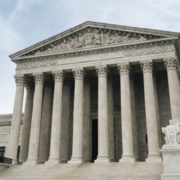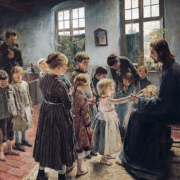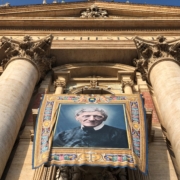On Receipt of the Lumen Vitae Medal
Address to Award Dinner at University of Mary, Bismarck, N.D.
Given October 23, 2018
One of the many reasons I appreciate this award is that it provides a welcome opportunity to consider all of God’s blessings to me and The Cardinal Newman Society over 25 years. Although it’s the Newman Society’s 25th anniversary, we haven’t had much time to celebrate. So, this is our celebration.
And I can’t think of a better way to celebrate than with our good friends at the University of Mary. What the University of Mary has achieved in recent years is incredible, and the Newman Society has been compelled not only to recognize this success but to promote it to Catholic families across the country. The University of Mary today is an inspiring example for the renewal of faithful Catholic education and a beacon of light in the otherwise dark landscape of Catholic higher education that has been largely secularized.
Our patron, Blessed John Henry Newman, was ultimately unable to see his splendid “idea” of an authentic Catholic university come to fruition in Dublin. But Msgr. Shea, leaders, and faculty of the University of Mary, you are truly building it right here in Bismarck!
In my 25 years with The Cardinal Newman Society, I have seen God bring about wonderful improvements in Catholic education. It’s so exciting! Several of the colleges that we recommend in our Newman Guide today weren’t in the initial guide more than a decade ago. Today the Newman Guide colleges are the gold standard for families seeking faithful Catholic education, and many Newman Guide colleges enjoyed record enrollment numbers this year, despite the fact that other private colleges around the country had a very tough year.
There is good news also in Catholic elementary and secondary education. While many parochial and diocesan schools are still closing, many of the schools that have a strong focus on mission and intentionally form saints have done very well. You’ll find many of these schools on our Catholic Education Honor Roll. Catholic homeschoolers and lay-led independent schools continue to increase. Their devotion to Christian formation and their ability to test both classical and innovative methods of teaching have been a boon to the Church. The widespread adoption of the Common Core in Catholic schools, which the Newman Society opposed, opened many eyes to the flawed practice of simply adopting secular state standards to guide Catholic education. Now the Newman Society’s Catholic Curriculum Standards are being used by 20 dioceses and other Catholic schools serving more than a quarter million students.
So in the past 25 years, God has truly blessed the renewal of Catholic education. And for The Cardinal Newman Society specifically, I am so grateful for all the marvelous ways God has brought such good out of our humble work.
I am sure that Monsignor Shea can attest to the many times a new idea or program begins with a stumble, and then God does such incredible things with it. It’s happened to the Newman Society so many times. And that, to me, is what this Lumen Vitae Award most importantly honors: the Grace of God, and what He has wrought through our service to Him.
That service depends heavily on some quite amazing people who advise me on our board of directors and those on my staff who do the work I’m not qualified to do. Two of them—Tom Mead and Cindy Laird—have been with me for well over a decade and during the Newman Society’s most productive years. Two of my other staff heroes are here tonight: our Vice President Bob Laird and his wife Gerri Laird, both of whom have done enormous work for the Newman Society in a variety of roles—and they have done so much for the Church in other ways as well. There are others back in Virginia, Florida, North Carolina, and elsewhere, who helped carry the Newman Society through these 25 years and also have been great inspirations to me because of their personal example.
Our donors, too, have been such a blessing, and not only for the obvious reason that their generosity is incredibly important to the Newman Society’s success. Even more, I’ve met many of them from all walks of life, and universally they have impressed me by their extraordinary goodness and devotion to the Church. They have been role models for my own personal and spiritual growth. That couldn’t be more true than it is of Deacon George and Marilyn Loegering, whose presence here tonight is yet one more demonstration of their kindness and friendship for so many years. Thank you!
It is also certainly true of the many educators with whom we work closely, including Monsignor Shea and several others among you here at the University of Mary. These are some of the most impressive people I know. I thank God for raising up such devoted and faithful educators.
Last but most, there are some people here who made a long trip because they love me and care for me so much, and I have depended on them for strength every day. My mother Mary Kay is here, and I know that my dad is here also in spirit. They gave so much of themselves for my own formation, and they were and always will be my models of Catholic education.
And my wife Rosario, teacher to my children and the light in my crazy life: her extraordinary insight about Catholic education and her example in founding and persevering with the Aquinas Learning hybrid program shapes my work with the Newman Society in every way. God has also wrought great things from her work. She has been with me and the Newman Society since its earliest days.
And my kids—Ana, Daniel, Nicholas, Joseph, and one more, Ian, who couldn’t be here—I am so proud of them and what they have taught me and their mom, even as we have tried to teach them.
So, you can see that God has surrounded me with magnificent people, which makes it difficult to fail. When Monsignor Shea offered me the Lumen Vitae award for my work with The Cardinal Newman Society, I was overwhelmed as always by the generosity and encouragement that he and the University of Mary have shown for our work to renew faithful Catholic education. But I asked his permission if I might at least verbally share this award with all those by whom God has brought about The Cardinal Newman Society’s 25 years of success.
And so I do want all those I mentioned to share in it, because you are such an important part of this work.
I don’t want to speak too long, but given these times we live in, I want to just add some brief observations concerning scandal and Catholic education’s response to it.
Jesus said that His own generation was an “evil generation.” But we too have come through such an awful year for the Church. I have found myself at times having difficulty working, because the bad news was flooding in so fast, and the betrayal by many of our priests and bishops is so depressing.
The Youth Synod this month was also disappointing. It exposed an astonishing lack of confidence among some Church leaders in the ability of the Church to teach the Faith to our young people. This lack of confidence in the teaching mission of the Church among perhaps most Catholic adults today is, in itself, a scandal to the young.
Scandal, of course, is nothing new to The Cardinal Newman Society. I founded the organization based on my own experience at a large Jesuit university. As editor of the student newspaper, I wrote about the scandals, eventually getting the attention of the local Cardinal. When a university official locked me out of the student newspaper office, I sent letters to top alumni donors, forcing the university to end its support of two radical student organizations.
A few years later, in Washington, D.C., I met several other young Catholics who felt the same anger and betrayal that I experienced, because of similar scandals at their Catholic colleges. But we didn’t lack confidence or hope in the Church, and we weren’t content to leave other young people in harm’s way. Instead, we worked together to establish The Cardinal Newman Society.
My point is that scandal deserves a bold and confident response. I was raised in the Saint John Paul II generation, and I take to heart his reminder of Jesus’ words, “Be not afraid!” Today’s scandals in the Church may be different in kind from what we experienced at wayward Catholic colleges. But still, I believe the response must be the same: a strong show of confidence in the Church that Christ established, and a renewed effort to propose and defend her teachings. A faithful Catholic university like the University of Mary can play a significant role in that.
Indeed, I would say that faithful Catholic education is the key solution to the challenges facing the Church. We need new generations of wise and virtuous Catholics who know and love Jesus in the Faith and traditions of His Church. We need them to renew the priesthood, renew the Church, and renew the culture.
But to get there, we adults can’t lack confidence in the truth of Christ’s teaching.
We can’t lack confidence in the role of parents as primary educators of their children.
We can’t lack confidence in Christ’s promise that the Church will prevail.
And we can’t lack confidence that God will reward those who stand firmly in the Faith.
On the other hand, we can’t doubt Christ’s words, that he who scandalizes young people would be better off “if a great millstone were put around his neck and he were thrown into the sea.” Believe it! And if we believe it, then we will stand as adults should and protect our young people from the harm that seems to await them on all sides.
Faithful Catholic education is the strength and the shield that we need to provide them. Forming them in both truth and love – in the skills of reasoning and the knowledge of Christ – is what young people need today to resist temptation to hopelessness and relativism.
If young Catholics cannot think reasonably, they will be unable to withstand the lies that our secular culture feeds them. Catholic education must return to its emphasis on forming the minds of young people, not just filling their heads with information.
But even more, Catholic education must lead young people to Christ. We must understand formation in the Catholic school or college as guiding young people into sainthood.
I am reminded of the 12th-century dispute between St. Bernard of Clairvaux and Peter Abelard, just as the first modern universities were on the rise. St. Bernard championed a “theology of the heart” that sought understanding of God not by reason but by prayer and adoration. Peter Abelard was an early scholastic who sought understanding of God by using reason to study the truths of the Faith. It was Abelard’s approach and the wisdom of scholastics like Thomas Aquinas that gave prominence to the great Catholic universities.
But can we claim that reason remains truly central to education today at many universities? Are young people prepared to recognize and understand truth? A Catholic school or college that truly forms young people in reason is a gift that our Church and culture sorely need today.
Still, Pope Benedict XVI warned American Catholic educators in 2008 that the “contemporary crisis of truth” which so deeply affects our young people is, at its heart, a “crisis of faith.”[1] In the 12th century, St. Bernard warned that there is “grave danger” in becoming too focused on reason in matters of faith. The result, he said, would be “intellectualism, the relativizing of truth, and the questioning of the truths of faith themselves.”[2]
Isn’t that an apt description of much of what ails Catholic education today? The irony is that while we do suffer these consequences, it can’t be because there is too much emphasis on rationality in our Catholic schools and colleges; if anything, reason is lacking. Instead, we find ourselves in an odd time when universities still lay claim to being the intellectual centers of our culture—and indeed there may still be valuable and reasoned dialogue among bright lights on college faculties—but young people are not being formed to carry on the conversation. At the same time, under the guise of rationality, God Himself is excluded.
Saint John Paul II said that “a Catholic university’s privileged task is ‘to unite existentially by intellectual effort two orders of reality that too frequently tend to be placed in opposition as though they were antithetical: the search for truth, and the certainty of already knowing the fount of truth’.”[3] Rediscovering the fount or source of truth in God, as well as recommitting to the scholastic ideal of rational exploration of our Faith with skilled reasoning and complete fidelity to the Church, are essential to the renewal of Catholic education.
Seeing this renewal play out at exceptional institutions like the University of Mary is, for me, the greatest gift after 25 years of promoting and defending faithful Catholic education. I see in the University’s leaders true love and devotion for God, and understanding that He is the source of wisdom and all reality. From that foundation, a great Catholic university is built.
I was thrilled to see on the University of Mary website a quote from Blessed John Henry Newman that I have cited many times, and it is as fitting now as ever to conclude with this thought:
“This is our hour, whatever be its duration: the hour for great hopes, great schemes, great efforts, great beginnings. We may live indeed to see but little built, but we shall see much founded. A new era seems to be at hand, and a bolder policy is showing itself… to recommence the Age of Universities.”[4]
[1] Pope Benedict XVI, “Address to Catholic Educators at The Catholic University of America” (Washington, D.C., April 17, 2008); retrieved from http://w2.vatican.va/content/benedict-xvi/en/speeches/2008/april/documents/hf_ben-xvi_spe_20080417_cath-univ-washington.html
[2] Pope Benedict XVI, General Audience (Vatican, Nov. 4, 2009); retrieved from https://w2.vatican.va/content/benedict-xvi/en/audiences/2009/documents/hf_ben-xvi_aud_20091104.html
[3] Pope Saint John Paul II, Ex corde Ecclesiae (Vatican, 1990), 1; retrieved from http://w2.vatican.va/content/john-paul-ii/en/apost_constitutions/documents/hf_jp-ii_apc_15081990_ex-corde-ecclesiae.html
[4] Newman, Historical Sketches: Volume III, 251.

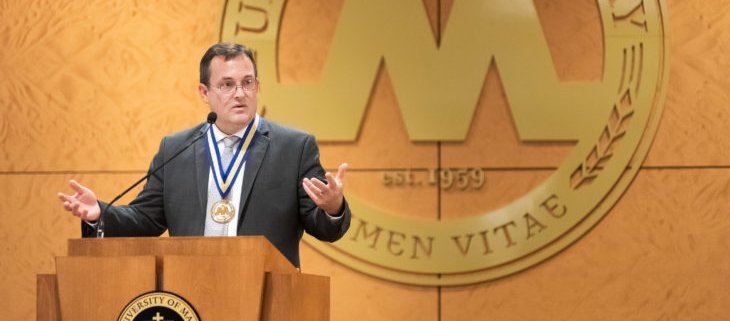
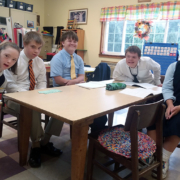

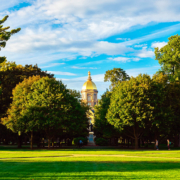 Photo by David Mark via Pixabay CC0
Photo by David Mark via Pixabay CC0